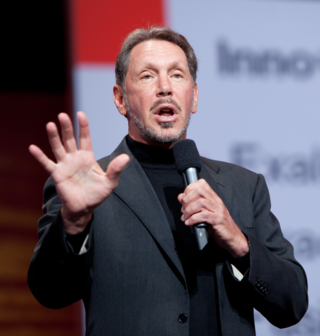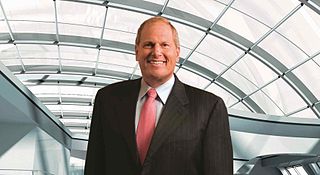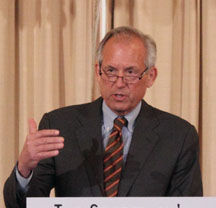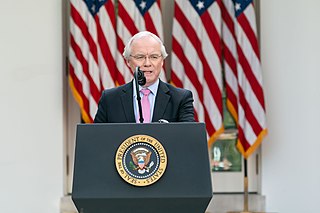
Steven Anthony Ballmer is a Swiss-American business executive and investor who was the chief executive officer of Microsoft from 2000 to 2014. He is the owner of the Los Angeles Clippers of the National Basketball Association (NBA). He is a co-founder of Ballmer Group, a philanthropic investment company.

Lawrence Joseph Ellison is an American businessman and entrepreneur who co-founded software company Oracle Corporation. He was Oracle's chief executive officer from 1977 to 2014 and is now its chief technology officer and executive chairman.

Berkshire Hathaway Inc. is an American multinational conglomerate holding company headquartered in Omaha, Nebraska, United States. Founded in 1839 as a textile manufacturer, it underwent a drastic restructuring into a conglomerate starting in 1965 under the leadership of chairman and CEO Warren Buffett and vice chairman Charlie Munger. The company's main business and source of capital is insurance, from which it invests the float in a broad portfolio of subsidiaries, equity positions and other securities. Buffett and Munger are known for their advocacy of value investing principles and under their direction, the company's book value has grown at an average rate of 20%, compared to about 10% from the S&P 500 index with dividends included over the same period, while employing large amounts of capital and minimal debt.

David M. Cote is an American businessman. Cote previously worked for General Electric and TRW Inc. before he was appointed chairman and chief executive officer (CEO) of Honeywell in 2002, following their acquisition by AlliedSignal. Cote also sat on the JP Morgan Chase risk committee during the period in which the firm lost $6 billion trading credit derivatives. Cote stepped down as CEO at Honeywell at the end of March 2017 and was succeeded by Darius Adamczyk. Cote is currently the executive chairman of Vertiv.

James Dimon is an American billionaire banker and business executive. He has been the chairman and chief executive officer (CEO) of JPMorgan Chase since 2006.
Chubb Limited is an American company incorporated in Zürich, Switzerland. It is the parent company of Chubb, a global provider of insurance products covering property and casualty, accident and health, reinsurance, and life insurance and is the largest publicly traded property and casualty insurance company in the world. Chubb operates in 55 countries and territories and in the Lloyd's insurance market in London. Clients of Chubb consist of multinational corporations and local businesses, individuals, and insurers seeking reinsurance coverage. Chubb provides commercial and personal property and casualty insurance, personal accident and supplemental health insurance, reinsurance, and life insurance.

John Thomas Chambers is the former executive chairman and CEO of Cisco Systems.

Robert Allen Iger is an American media business executive who serves as the chief executive officer (CEO) of The Walt Disney Company. He previously served as the President of the American Broadcasting Company (ABC) between 1994 and 1995 and as president and chief operating officer (COO) of Capital Cities/ABC, from 1995 until its acquisition by Disney in 1996. Iger was named president of Disney in 2000 and succeeded Michael Eisner as CEO in 2005, until his contract expired in 2020. He then served as executive chairman until his retirement from the company on December 31, 2021. After his exit from the company, Iger served, at the company's request, as an advisor to his successor. Iger was awarded $2 million per year for such advice. However, at the request of Disney's board of directors, Iger returned to Disney as CEO on November 20, 2022, following the unscheduled and immediate dismissal of his appointed successor, Bob Chapek. In July 2023, Disney renewed Iger's contract until 2026.
Ahmed Fahour is a Lebanese Australian businessman. He was the managing director (MD) and CEO of Latitude Financial Services, and was formerly MD and CEO of Australia Post, and CEO Australia of the National Australia Bank (NAB).
Richard Dana Fairbank is an American billionaire businessman who co-founded Capital One with Nigel Morris in 1988. He previously served on the board of directors of MasterCard International from 2004 through 2006. He is a member of the Stanford Business School advisory council, the Financial Services Roundtable, and the board of directors of the BITS Technology Forum.

Robert Louis Nardelli is an American businessman who was the CEO of Freedom Group from September 2010 to March 2012. Prior to that role, Nardelli served as chairman and CEO of Chrysler from August 2007 to April 2009 and CEO of The Home Depot from December 2000 to January 2007. Before joining The Home Depot, Nardelli spent most of his career at General Electric and had risen to become one of the top three executives competing to succeed Jack Welch.

Vikram Shankar Pandit is an Indian-American banker and investor who was the chief executive officer of Citigroup from December 2007 to 16 October 2012 and is the current chairman and chief executive officer of The Orogen Group.
Executive compensation is composed of both the financial compensation and other non-financial benefits received by an executive from their employing firm in return for their service. It is typically a mixture of fixed salary, variable performance-based bonuses and benefits and other perquisites all ideally configured to take into account government regulations, tax law, the desires of the organization and the executive.

Kenneth Carleton Frazier is an American business executive. He is executive chairman and former CEO of the pharmaceutical company Merck & Co.. After joining Merck & Co. as general counsel, he directed the company's defense against litigation over the anti-inflammatory drug Vioxx. Frazier is the first African American man to lead a major pharmaceutical company. He was elected to the American Philosophical Society in 2018.

Walter James "Jim" McNerney Jr. is a business executive who was President and CEO of The Boeing Company from June 2005 to July 2015. McNerney was also Chairman from June 2005 until March 1, 2016. McNerney oversaw development of the Boeing 737 MAX.

In the United States, the compensation of company executives is distinguished by the forms it takes and its dramatic rise over the past three decades. Within the last 30 years, executive compensation or pay has risen dramatically beyond what can be explained by changes in firm size, performance, and industry classification. This has received a wide range of criticism leveled against it.

William Rodney McMullen is an American businessman who has been the CEO of Kroger, the third-largest general retailer in the US, since January 1, 2014.

David Alfred Perdue Jr. is an American politician and business executive who served as a United States senator from Georgia from 2015 to 2021. A member of the Republican Party, Perdue was an unsuccessful candidate for Governor of Georgia in 2022.
Frank J. Bisignano is an American businessman and the President and CEO of Fiserv. He previously served as the CEO of First Data Corporation and the COO of JPMorgan Chase.
Luca Maestri is an Italian businessman. He is the Chief Financial Officer (CFO) of Apple Inc..
















